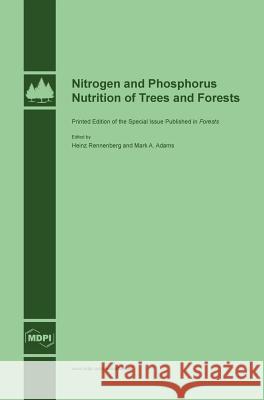Nitrogen and Phosphorus Nutrition of Trees and Forests » książka
Nitrogen and Phosphorus Nutrition of Trees and Forests
ISBN-13: 9783038421856 / Angielski / Twarda / 2016 / 254 str.
Nitrogen (N) and phosphorus (P) nutrition of trees has been studied for many decades, but has largely been focused on inorganic nutrient uptake and leaf level nutrient contents. In recent years it became obvious that N and P cycling at the ecosystem level is of vital importance for tree nutrition and that organic N uptake by trees is an essential part of ecosystem N cycling; in particular on N and/or P poor soils, and in cooler climates. The significance of organic P uptake by trees is still a matter of debate, especially under field conditions. The overlay of climate change on ecosystem N and P cycling has become an important issue of forest research. This overlay raises questions around competition for N and P among structural elements (overstorey vs. undestorey), as well as among dominant species. Many nutritionally related aspects of changing climates, such as effects on rhizosphere and phyllosphere, remain seriously under-studied. The central aim of this Special Issue is to provide new insights into some of these topics at the tree, and the ecosystem level.
Nitrogen (N) and phosphorus (P) nutrition of trees has been studied for many decades, but has largely been focused on inorganic nutrient uptake and leaf level nutrient contents. In recent years it became obvious that N and P cycling at the ecosystem level is of vital importance for tree nutrition and that organic N uptake by trees is an essential part of ecosystem N cycling; in particular on N and/or P poor soils, and in cooler climates. The significance of organic P uptake by trees is still a matter of debate, especially under field conditions. The overlay of climate change on ecosystem N and P cycling has become an important issue of forest research. This overlay raises questions around competition for N and P among structural elements (overstorey vs. undestorey), as well as among dominant species. Many nutritionally related aspects of changing climates, such as effects on rhizosphere and phyllosphere, remain seriously under-studied. The central aim of this Special Issue is to provide new insights into some of these topics at the tree, and the ecosystem level.











